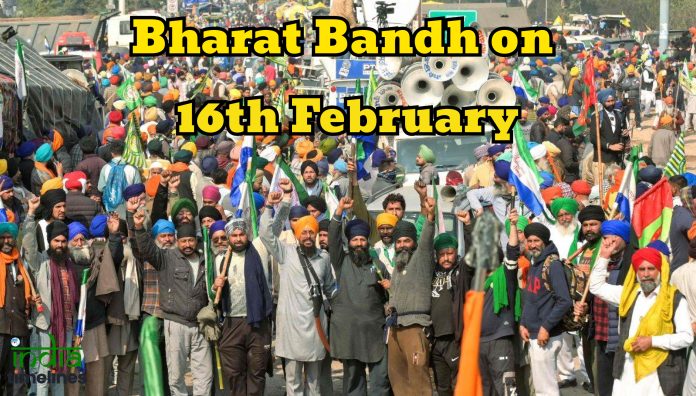
Harmeet Singh Kadian, representing the Bharatiya Kisan Union (Kadian), has mobilized farmers nationwide for a strike on February 16, amplifying their resistance. Simultaneously, protests are scheduled at toll plazas in Punjab on February 15, heightening their collective voice. In the ongoing ‘Delhi Chalo’ march, thousands of farmers persist in their unwavering protest against existing agricultural policies. Tensions rise as the central government and farmer leaders gear up for a crucial third round of discussions, with Union Ministers Arjun Munda, Piyush Goyal, and Nityanand Rai engaging in a robust video conference. Previous negotiation failures sparked the farmers’ march on February 13, resulting in increased clashes at the Shambhu border. Haryana Police reinforcements at the Khanauri-Datta Singhwala border impede farmers’ progress, while Delhi Police issue a traffic alert for the DND Flyway. Key points in Delhi are fortified, indicating a determined effort to hinder the farmers’ advance.
The Bharat Bandh call comes amidst hundreds of farmers marching from Punjab being halted at the state’s border with Haryana near Ambala. Several farmers’ unions, including the Samyukta Kisan Morcha (SKM), have called for a Gramin Bharat Bandh or nationwide strike on Friday, February 16, to push for their demands before the Centre. The Samyukta Kisan Morcha has urged all like-minded farmers’ organizations to unite and participate in the February 16 Gramin Bharat Bandh called by the central trade unions. The Bharat Bandh call comes even as hundreds of farmers marching from Punjab have been stopped at the state’s border with Haryana near Ambala, approximately 200 kilometers away from Delhi. Haryana security forces have used tear gas to disperse them. A Delhi Police source stated they are determined to prevent the protesters from entering the national capital should they advance. The Samyukta Kisan Morcha (non-political) has urged all like-minded farmer organizations to unite and participate in the Bharat Bandh. The day-long protest will commence from 6 am to 4 pm.
Gramin Bharat Bandh: Potential Impact on Various Sectors
The nationwide strike called by farmer unions on Friday, February 16, is anticipated to affect transportation, agricultural activities, Mahatma Gandhi National Rural Employment Guarantee Act (MNREGA) projects, private offices, village shops, and rural industrial and service sector establishments. Emergency services like ambulance operations, newspaper distribution, weddings, medical shops, and students heading for board exams may reportedly remain unaffected during the strike.
What are farmers requesting?
Farmers in Punjab and Haryana have once again taken to the streets, advocating for a law that ensures a Minimum Support Price (MSP) for their agricultural produce.
Additionally, they are urging for the reinforcement of the Mahatma Gandhi National Rural Employment Guarantee Scheme (MGNREGS), reinstatement of the previous pension scheme, and the provision of pension and social security for all workers, irrespective of their formal or informal employment status.
The Samyukt Kisan Morcha (SKM) has addressed Prime Minister Narendra Modi, outlining their demands, which include MSP for crops based on the Swaminathan formula of C2 50 (ensuring 50 percent profit above input costs), legal assurance of procurement, debt relief, no escalation in electricity tariffs, and no installation of smart meters.
Furthermore, they are requesting 300 units of free power for agricultural and domestic use, comprehensive crop insurance, and an increase in pensions to ₹10,000 per month, among other demands.
What happened to the government-appointed MSP panel formed after the 2021 farmers’ protest?
During the Bharat Bandh scheduled for Friday, essential services such as ambulance operations, weddings, medical facilities, schools, etc., will remain unaffected.
Public intellectuals support farmers
A coalition of public intellectuals and artists has come together to express their solidarity with the joint call made by workers and farmers for a sector-wide industrial strike and a rural India shutdown on February 16th.
In a joint statement signed by 34 individuals, including prominent figures like economist Prabhat Patnaik, historian Irfan Habib, economic historian Nasir Tyabji, cultural activist Anil Chandra, and journalist P Sainath, the group urges people from all walks of life to rally behind this significant action initiated by farmers and workers.
The statement highlights the collaboration between Central Trade Unions (CTUs) and the Samyukta Kisan Morcha (SKM), emphasizing their united front in response to the government’s pro-corporate, anti-people policies under the BJP-led administration.
By joining forces, farmers and workers aim to counter the government’s aggressive measures affecting their lives and livelihoods, as well as its divisive communal rhetoric aimed at undermining collective resistance. The statement envisions this alliance gaining momentum as it spreads its message across the nation.
‘Delhi March’ Protest
Farmers from Punjab have established camps at the Shambhu and Khanauri borders of Punjab and Haryana, with the aim of marching towards Delhi to urge the Central government to address their demands.
According to an official, the Delhi Police has ordered more than 30,000 tear gas shells in preparation for preventing Punjab farmers from entering the national capital as part of their ‘Delhi March’ protest.
2020 Farmers’ Protest
During their protest in 2020, farmers from various states, predominantly Punjab, Haryana, and Uttar Pradesh, conducted a sit-in at the Singhu, Ghazipur, and Tikri borders. This protest endured from August 2020 to December 2021.
In 2020, police had to swiftly arrange logistics to impede the entry of farmers advancing in a procession of tractor
Announcement of Bharat Bandh on 16th February
In response to the government’s failure to address their demands, farmer unions have declared a Bharat Bandh on 16th February. This nationwide protest aims to amplify their voices and compel the government to repeal the farm laws.
Objectives of the Nationwide Protest
The primary objective of the Bharat Bandh is to press the government to meet the demands of the farmers, which include the repeal of the contentious farm laws and the implementation of a legal guarantee for MSP.
Demands of the Farmers
- Repeal of the three farm laws: Farmers demand the complete withdrawal of the Farmers’ Produce Trade and Commerce (Promotion and Facilitation) Act, the Farmers (Empowerment and Protection) Agreement on Price Assurance and Farm Services Act, and the Essential Commodities (Amendment) Act.
- Legal assurance for MSP: Farmers seek a legal guarantee ensuring the continuation of the MSP system for all agricultural produce.
Anticipated Impact of Bharat Bandh
The Bharat Bandh is expected to have significant repercussions across various sectors, including the economy and politics.
Economic Impact
- Disruption of transportation: With road blockades and closures, transportation of goods and services is likely to be severely impacted.
- Shutdown of markets: Businesses, especially in urban areas, may experience closures due to the bandh, leading to financial losses.
Political Implications
The success or failure of the Bharat Bandh will undoubtedly have political ramifications, influencing public perception and potentially shaping future policies.
Preparation and Planning by Farmer Organizations
Farmer unions have been actively mobilizing support for the Bharat Bandh, organizing rallies, meetings, and awareness campaigns to garner public support and participation.
Support and Opposition to Bharat Bandh
While the Bharat Bandh has received widespread support from various sections of society, including opposition parties and trade unions, there are also voices of dissent who question the efficacy of such protests.
Media Coverage and Public Opinion
The Bharat Bandh is expected to dominate media headlines, with extensive coverage and analysis of its implications. Public opinion remains divided, reflecting the polarized nature of the issue.
Government Response and Contingency Plans
The government has adopted a firm stance against repealing the farm laws but has expressed willingness to engage in dialogue with the protesting farmers. Contingency plans are in place to maintain law and order during the Bharat Bandh.
Safety Measures for Participants
Organizers have emphasized the importance of peaceful protests and have urged participants to adhere to safety protocols to prevent any untoward incidents.
Previous Instances of Bharat Bandh
Historically, Bharat Bandhs have been employed as a potent tool by various social and political movements to highlight grievances and mobilize public support.
Challenges and Criticisms Faced by Farmer Protests
Despite widespread support, farmer protests have faced criticism from certain quarters, questioning their methods and impact on daily life.
Importance of Peaceful Protest
Maintaining the peaceful nature of the protest is crucial to ensuring its success and garnering widespread support from the public and policymakers alike.
Conclusion
The Bharat Bandh on 16th February represents a pivotal moment in the ongoing farmer protests, with significant implications for the future of agriculture and governance in India. As the nation braces for yet another day of protest and dissent, the spotlight remains firmly on the government’s response and the resolution of the farmers’ demands.
FAQ
1. What is Bharat Bandh?
Bharat Bandh is a nationwide protest where all activities, including businesses and transportation, come to a halt.
2. Why are farmers protesting?
Farmers are protesting against the new farm laws introduced by the government, which they believe will adversely affect their livelihoods.
3. What are the demands of the farmers?
The primary demands of the farmers include the repeal of the farm laws and a legal guarantee for MSP.
4. How will the Bharat Bandh impact the economy?
The Bharat Bandh is expected to disrupt economic activities, leading to financial losses for businesses and industries.
5. What measures are being taken to ensure the safety of participants during the protest?
Organizers have urged participants to maintain peace and adhere to safety protocols to prevent any untoward incidents.

































